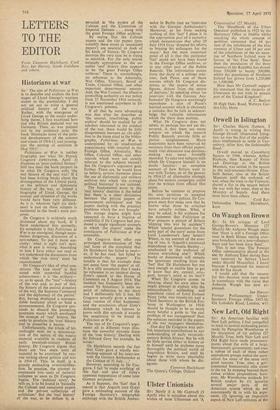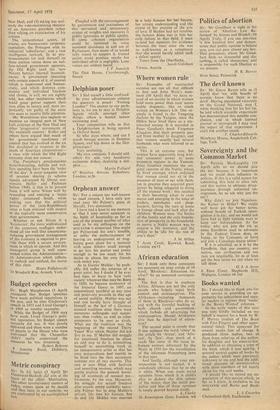New Left, Old Right
Sir: An American familiar with New Left politics, I feel compelled to react to several misleading points made by Peregrine Worsthorne in his discussion of us politics (27 March). True, both New Left and Old Right have made pronounce- ments about the evils of a large, bureaucratic government; and true. a subset of each of these rather amorphous groups makes the accu- sation for some of the same very good reasons. True, also, a gov- ernmental bureaucratic elite exists in the us. In stepping beyond these rather evident propositions, how- ever, Mr Worsthorne misleads his British readers by (1) ignoring several major parts of the American system which do not conveniently fit in with his argu- ment, (2) ignoring an important aspect of New Left criticism of the
New Deal, and (3) taking too seri- ously the vote-maximising rhetoric of an American president rather than relying on examination of his actions.
The unmentioned actors, of course, are bureaucratic corporate capitalism, the Pentagon with its industrial 'subsidiaries', and a vast intelligence network. In its pro- nouncements (or lack thereof) on these entities versus those on wel- fare-related government agencies, the Old Right (and the 'new Nixon) betrays internal inconsist- encies. A government (meaning only certain aspects of it, of course) which is impersonal and bureau- cratic, and which destroys com- munity and individual freedom and choice, is evil, we are rightly told, but other institutions which wield great power support their own elites in luxury and, most im- portantly, arc guilty of the same sins seem to receive little attention.
Mr. Worsthorne also neglects to mention an integral part of New Left criticism of the New Deal and other 'progressive' movements of the twentieth century: Kolko and others have argued that much of the government machinery of control that has evolved in the us has developed in response to the needs of American corporations— a view with which the Old Right certainly does not concur.
The President's proclamations notwithstanding, deficits and wel- fare spending have been the 'order of the day'. A more sanguine view of revenue sharing (a scheme openly advocated by liberal eco- nomists Heller and Pechman before 1968), is that in its present form it will serve Nixon well by rewarding and enticing a 'states rights' orientated South, while making sure that the political Power of the (non-Republican) cities is kept minimal with respect to the typically more conservative Slate governments.
Whether or not Nixon is a 'Keynesian', the more sophisticated of the corporate managers under- stand all too well that uncertainty- reducing government management of the economy is required to pro- vide them with a secure environ- ment in which to operate. And this managerial group is well repre- sented within the Administration—. an Administration which reflects, in outlook and method, the mores of this class.
Henry Pollakowskl 74 Windmill Rise, Acomb, York







































 Previous page
Previous page